- Home
- Ward Wagher
Accidental Nazi
Accidental Nazi Read online
Accidental Nazi
Ward Wagher
Copyright © 2016 Ward Wagher
All rights reserved.
ISBN:1539773248
ISBN-13:978-1539773245
Cover by Ellen Anne Eddy Bowers
DEDICATION
To those who fought the Nazi menace of the 1940’s, both inside and outside of the German Reich. May we never see another evil like that stalk the Earth..
CONTENTS
One
Two
Three
Four
Five
Six
Seven
Eight
Nine
Ten
Eleven
Twelve
Thirteen
Fourteen
Sixteen
Seventeen
Eighteen
Nineteen
Twenty
Twenty-One
Twenty-Two
Twenty-Three
Twenty-Four
Twenty-Five
Twenty-Six
Twenty-Eight
Twenty-Nine
Thirty
Thirty-One
Thirty-Two
Thirty-Three
Thirty-Four
Thirty-Five
Thirty-Six
Thirty-Seven
Thirty-Eight
Thirty-Nine
Forty
Forty-One
Forty-Two
Forty-Three
Forty-Four
Forty-Five
Epilogue
The Author
ACKNOWLEDGMENTS
Thanks, Al and Ric who read the draft and gave comments. Thanks, Bob, for reviews and editing. Thanks, readers for your continued interest in these books.
.
PROLOGUE
June 10, 1941 11:00 AM
Over Central Germany
The Junkers JU-52 cruised easily at 2,500 meters in the summer sky on this trip from Munich to Berlin. The passenger load was light today. Adolf Hitler and a few aides returned from a Nazi Party banquet held the night before. The morning flight would land at Berlin's Tempelhof airport between 11 AM and noon.
Hitler jotted notes related to a few upcoming speeches. Operation Barbarossa would kick off in less than two weeks. This was his most audacious gamble yet. Russia was a slumbering giant, and he planned to drive a stake through the heart of that nation while it slept. The prize was an unimaginable trove of raw materials and laborers. He would provide living space in the Ukraine and other eastern territories for generations of Aryans to build wealth for Germany. He would once and for all eliminate the communist threat to his land.
Yet, he knew that the people of Germany would be uncomfortable with opening another front in the war. Hitler had spent hours in planning with Joseph Goebbels, the minister of propaganda, so that the message would ring clearly about the country. The German folk would simply be reaching for the land that was rightfully theirs. Populated by subhuman peasants, the undeveloped lands were the canvass on which he was painting the thousand year Reich.
He only hoped his followers were up to the challenge. Rudolf Hess, the Deputy Fuhrer had been with Hitler since nearly the beginning and had given dog-like devotion. Unfortunately, Hess was beginning to be somewhat erratic. He had opposed Barbarossa because of the risk. He didn't understand that great deeds involved a certain element of risk. Hitler had begun to wonder if Hess might also be mentally unstable.
Heinrich Himmler, the head of the SS, was the nation's top policeman. Himmler efficiently liquidated opponents to the Nazi Party along with other undesirables. He was working diligently on a plan to rid Germany of the pestilential Jews. Himmler understood the need to grasp for great deeds. The creation of those great factories designed to consume Jews, Gypsies and homosexuals and produce ash had appalled and frightened many in the governmental hierarchy. But Himmler proceeded because he not only knew that was what the Fuhrer desired, but was devoted to the same ideals.
Hermann Goering was another question mark. Goering had also been with Hitler since the early days. In fact, Hermann had been wounded during the abortive Munich putsch. A lover of the trappings of power, Goering had commissioned for himself a series of flamboyant uniforms, and outfitted his houses in sumptuous style. His management of the war industries was barely competent; however, the man was also unfailingly loyal to the Fuhrer. Hitler wondered where he could find both loyalty and competence.
Heinrich Schloss was an enigma. The new party leader was almost frighteningly competent. And his longstanding devotion to Hitler was not held in question by anybody. Yet, he had murdered Martin Bormann – his predecessor in the Nazi party leadership. Hitler was certain it was murder, not an execution as the ambitious Schloss had claimed. No one disputed that Bormann was good at what he did, but Schloss brought a rigorous Teutonic efficiency to the party offices. Hitler was satisfied to let the other members of his inner circle wonder about the circumstances surrounding Bormann's death. They were easier to manage if each was fearful of the other. And Hitler knew that with the snap of his fingers, Himmler would follow his bidding and quickly eliminate any possible threat from Schloss.
The only concern of Hitler's at this point was that Schloss had joined with Hess in vociferously opposing Barbarossa. And Schloss's arguments held water. This had almost made Hitler hesitate. But his instincts had proven correct time and again. Hitler reminded himself that the people of Germany required a wise leader to point them in the right direction. This included the leadership of the nation. And Hitler was that wise leader. The rest of the world had consigned Germany to the carrion that had picked at the carcass of the nation for over a decade following the Great War. Under Hitler the country had climbed out of the pit dug for it by the victorious allies. No one doubted Hitler's leadership.
In the cockpit Hans Baur frowned at the controls. A last minute mechanical problem had sidelined the Focke-Wulf Condor normally flown by the Fuhrer. They were once again in the Immelman II that had served for years as Hitler's official transport. The Junkers JU-52 was a robust and forgiving bird. Though not fast, it was reliable. Hitler had only nodded when informed they would take the older aircraft.
Baur had over twenty years’ experience as a pilot. He was frowning over the Junkers' increasing tendency to dip its port wing during low speed operations – such as during landings. Baur had not reached his age and experience by being careless. He intended to down-check the bird after the landing at Tempelhof. One did not take chances while transporting the Fuhrer around the country.
The June sun baked the cockpit, and Baur wished he had not had the heavy breakfast of sausage and potatoes before flying. The onset of heartburn was sudden and vicious. Baur felt the sweat break out on his forehead and he loosened his seat belt. He reached up and slid the window open slightly on his left. The rush of cool air felt good.
“Everything okay, Herr Baur?” the copilot asked.
“Yes. Just a little heartburn.”
The copilot chuckled. “Not surprising the way you were putting away that breakfast.”
“A man of my constitution needs all the fuel he can get.”
The copilot returned to his scan of the instruments. He then looked out the windows and carefully watched for any possible threats. He had been selected for this task for both his exceptional flying skills and his caution. Both men were very careful.
One half hour later, they began their descent to Tempelhof. Baur looked out at the four Focke-Wulf 190 fighters flying escort and frowned. He picked up his microphone.
“Eagle Leader to Eagle Flight. Please loosen up the formation a bit.” He listened for the acknowledgements, and hung the microphone in its clip.
“A mid-air would ruin our
day,” the copilot said with a smile.
“I suppose I should be thankful for the escort,” Baur said as he belched, “but they frankly worry me more than the chance encounter with an English Wellington at this time of day.”
“No argument there.”
The cabin steward poked his head into the cockpit. “Are we on approach, Sir?”
Baur nodded. “Yes. Please notify the Fuhrer we will be on the ground in about fifteen minutes.”
He looked over at the copilot. “All right, Peter, pilot's airplane.”
“Pilot's airplane,” the copilot repeated. He held his hands up to indicate he relinquished control.
Baur pulled the three throttles back and let the plane descend. He banked to line up with the runway as they encountered some mild turbulence. The Junkers wallowed and the left wing began to drop.
“Come on, you old cow!” Baur muttered as worked the control wheel to keep the wings level.
The indigestion was now a fire in his chest and the pain spread down his left arm. When they got on the ground he would definitely look for a bicarbonate of soda. He was rapidly losing his sense of humor.
Baur eased the airliner into the ground envelope. He loved to smooth the plane out, reduce power, and let it settle to the ground in a feather smooth landing. However, one of the aileron hinges had worked its way loose, contributing to the plane dipping a wing in low speed maneuvers. Now the hinge separated, dropping the aileron into the slip stream. First the plane bobbed up, and began turning to the left due to the extra drag. Then the wing dipped abruptly.
Baur cursed and pushed on the right rudder peddle, and twisted the wheel to straighten the airplane. Simultaneously he felt a crushing weight on his chest as the developing coronary stopped his heart. He cried out, as the copilot watched in horror. The copilot grabbed the controls in an attempt to salvage what had started out as one of Hans Baur's signature perfect landings. He was a half second too late. The left wing dug into the ground.
CHAPTER ONE
October 22, 2481 AD; 4 AM
Urbana Quantum Physics Laboratory,
Upper Midwest Palatinate, North America
Edgar Forsenn felt the effects of going two nights without sleep. The excitement of the project had fed the adrenalin into his system, and now that was losing its effectiveness. But, he did not want to wait another day. He had checked and rechecked his calculations. The test apparatus was assembled. He ran the checklist through his mind. Yes, he had thought of everything. There was no reason for him not to run the experiment.
True, the director of the laboratory had established the policy that forbade major experiments from running without a full crew on hand to observe. His coworkers had strenuously impressed upon him the need for them to check his preparations. To be honest some previous spectacular failures on his part had driven their insistence on being present for any major evolutions.
But this was the fulfillment of a lifetime's work. The invention of quantum tunneling technology had revolutionized space travel. Indeed it had made interstellar travel possible. The same basic theories had also made possible the refinement of thermonuclear power generation as well as power transmission. Even the cybernetics technology depended upon the outgrowth of research into quantum physics.
During the course of research Forsenn had discovered certain side effects of the quantum tunneling that he concluded were tachyons thrown off during the process. His calculations indicated the possibility of a time-shifting phenomena which he was sure would ultimately present an opportunity to open a window and peer into the future or the past. Not only would this fulfill his lifetime quest, but would also secure his reputation as one of the foremost scientists of the age – and once and for all lay to rest his reputation as an impulsive bumbler.
He rubbed the grit deeper into this eyes and stared owlishly at the three-dimensional chrono display blinking on the corner of work space. His colleagues knew he was getting close to running the experiment, and had warned him to wait until they arrived in the morning. He knew they would arrive early, but he really did not want to wait. He mentally rehearsed his responses to the inevitable confrontation that would occur when it became clear he was too impatient to wait.
Unbidden an old joke came to mind. When he was asked, as he was sure to be, what he was thinking in running an experiment that tampered with the physical barriers of the universe, considering the possible dangers, he would reply that's why I did it at night. His silly giggle was yet more evidence that he hadn’t slept for far too long.
He mentally pondered the experiment one more time, then shrugged. Either it would work, or it wouldn't. He reached into the three-dimensional display his comp term projected onto his work area and twisted an icon. For a moment nothing happened as the comp term sent commands in a hundred directions through the lab. Then he heard the Spence cold fusion generators spin up. Invented two-hundred years previously, cold fusion was not widely used due to the prevalence of power delivered from grav powered fusion stations. But the paladin had insisted the lab have an independent power supply for its experiments.
The fail-safe Forsenn had engineered into the experiment now blinked at him. Did he want to continue? The little round icon blinked blue and green in the middle of his workspace. He considered things one more time, the extended his hand and drove it flat. The keening generators rose in volume and pitch and the components of the apparatus awakened in sequential order. The comp term activated the data collection modules and terrabytes of telemetry flowed from the systems.
The system he had constructed reached its climax and he held his breath as the mechanism tipped over into a cascade of quantum micro-events. It seemed to Forsenn that the unwinking lights which illuminated the lab may have flickered briefly, but it also could have been the grit in his eyes. There were no other perceptible results of the experiment other than the numbers streaming across the projection on his desk; nor did he expect any.
Another timer kicked over in the comp term, and the experiment gracefully shut itself down. A brief examination of the logs indicated that everything performed nominally. From that standpoint the experiment was a success. He knew that it would take months of hard work to tease the results from the volumes of test data he had collected. His place in history was now assured, he thought.
Edgar Forsenn's satisfaction and growing self-confidence was shattered minutes later with the arrival of his colleagues. They brought with them the evidence that the experiment succeeded beyond his wildest dreams. They also confirmed that the disastrous side-effect was the stuff of his worst nightmares.
Months of frantic research along with new calculations drove Edgar and his Colleagues at the Urbana Quantum Physics Laboratory to the conclusion that the experiment had not reached back into time, but rather across multiple parallel universes. In so doing he had impacted the lives of several billion beings. Creation had changed.
# # #
May 23, 1982 11:30 AM
Berlin Tempelhof Airport
Heinrich Schloss arrived early at Tempelhof. The Sunday traffic was unpredictable and he had no desire to force Trudy to wait impatiently as her mother made rude comments about his reliability. His wife and mother-in-law would shortly arrive on a British Airways 737 after a weekend trip to London's shopping district, and he had postponed his Sunday afternoon chess game to retrieve the women.
With an hour to wait, Schloss took advantage of the opportunity for some exercise, and walked the long, curving terminal building, studying the humanity that flowed through this gateway to the free world. He was a historian by trade, and specialized in the study of the abomination that was Nazi Germany. Those dark years ended with the sack of Eastern Europe and the rape of Berlin by the Soviets, as Germany lay prostrate at the feet of the victorious allies.
A modest man, the thirty-seven-year-old Heinrich Schloss nevertheless had made it his goal in life to patiently explain the past to the students of this generation in the hope that the evils represented by the N
azis would never happen in his country again. As he marched along the terminal his mind slipped into its familiar paths as he pondered the events he had dedicated his life to study, and wondered once again what could have been done to prevent the calamity.
Someday, he hoped, the Soviets would release their iron grip over the carcass of East Berlin, and East Germany, and the practical Germans could rebuild their broken country. He honestly expected nothing like that to happen during his life time. He certainly could understand the Russian paranoia over Germany. Twice during the first half of the century Russia had suffered from an invasion of the arrogant and globe-striding Germans. For all his megalomania and incipient madness, no one blamed Stalin for doing everything within his power to see to it that nothing like that ever happened again.
West Berlin could be a depressing place. The daily activities of the residents, yes even the entertainment, had a slightly manic quality as everyone strove for normality in the island of freedom surrounded by a sea of communist zeal. It was well known that the levels of suicide in the city were much higher than anywhere else in free Europe. Schloss was rarely depressed, however. He loved his city and dreamed of a free and united Germany.
As he walked, the ever-present fog of tobacco smoke began to affect him. This was another of the afflictions of the city, and he had become increasingly sensitive to it. He suffered severe headaches, often brought on by the heavy tobacco smoke. He stepped outside for some fresh air, and a closer view of the runways, hoping to clear his sinuses. The warm, spring day was certainly pleasant. The breeze carried the scent of kerosene exhaust, but it was an improvement compared to the air inside.
He stuck his hands in his pockets and sauntered along the walkway in front of the terminal when he suffered a stabbing pain in his right temple. He closed his eyes and massaged the sides of his head with his hands, hoping this wasn't the onset of a migraine. Trudy would not be pleased to drive him home as he curled up in the back seat of their Passat. Trudy's mother would certainly have something to say about it as well.

 The Mountains of Montora (The Chronicles of Montora Book 1)
The Mountains of Montora (The Chronicles of Montora Book 1) Nazi Magician: Inventor
Nazi Magician: Inventor The Last Paladin
The Last Paladin Inconsequential Nazi
Inconsequential Nazi Impossible Nazi
Impossible Nazi The Snows of Montora (The Chronicles of Montora Book 3)
The Snows of Montora (The Chronicles of Montora Book 3) The Margrave of Montora (The Chronicles of Montora Book 2)
The Margrave of Montora (The Chronicles of Montora Book 2)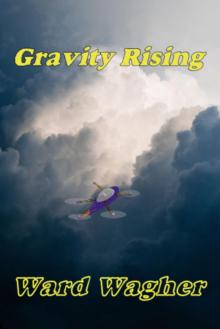 Gravity Rising (The Parallel Multiverse Book 2)
Gravity Rising (The Parallel Multiverse Book 2)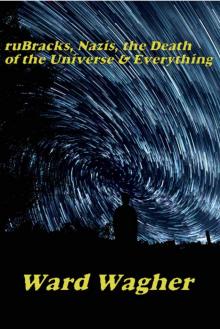 ruBracks, Nazis, the Death of the Universe & Everything (The Parallel-Multiverse Book 1)
ruBracks, Nazis, the Death of the Universe & Everything (The Parallel-Multiverse Book 1)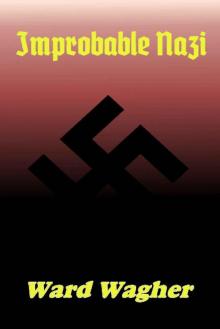 Improbable Nazi (Parallel Nazi Book 2)
Improbable Nazi (Parallel Nazi Book 2)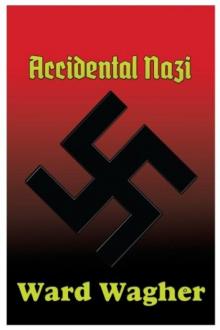 Accidental Nazi
Accidental Nazi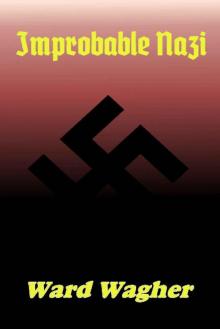 Improbable Nazi
Improbable Nazi